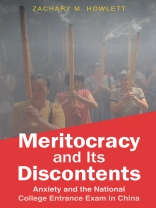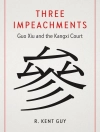Meritocracy and Its Discontents investigates the wider social, political, religious, and economic dimensions of the Gaokao, China’s national college entrance exam, as well as the complications that arise from its existence. Each year, some nine million high school seniors in China take the Gaokao, which determines college admission and provides a direct but difficult route to an urban lifestyle for China’s hundreds of millions of rural residents. But with college graduates struggling to find good jobs, some are questioning the exam’s legitimacy—and, by extension, the fairness of Chinese society. Chronicling the experiences of underprivileged youth, Zachary M. Howlett’s research illuminates how people remain captivated by the exam because they regard it as fateful—an event both consequential and undetermined. He finds that the exam enables people both to rebel against the social hierarchy and to achieve recognition within it.
In Meritocracy and Its Discontents, Howlett contends that the Gaokao serves as a pivotal rite of passage in which people strive to personify cultural virtues such as diligence, composure, filial devotion, and divine favor.
Innehållsförteckning
1. A Fateful Rite of Passage: The Gaokao and the Myth of Meritocracy
2. Mobility, Time, and Value: The High Stakes of Examinationand the Ideology of Developmentalism
3. Counterfeit Fairness: State Secrets and the False Confidence of Test Takers
4. Diligence versus Quality: Merit, Inequality, and Urban Hegemony
5. Courage under Fire: The Paradoxical Role of Head Teachers and the Individualizing Moment of Examination
6. Magicand Meritocracy: Popular-Religious Responses to Examination Anxiety
Epilogue: Lost and Confused
Om författaren
Zachary M. Howlett is Assistant Professor of Anthropology at Yale-NUS College at the National University of Singapore












